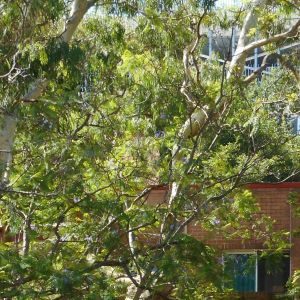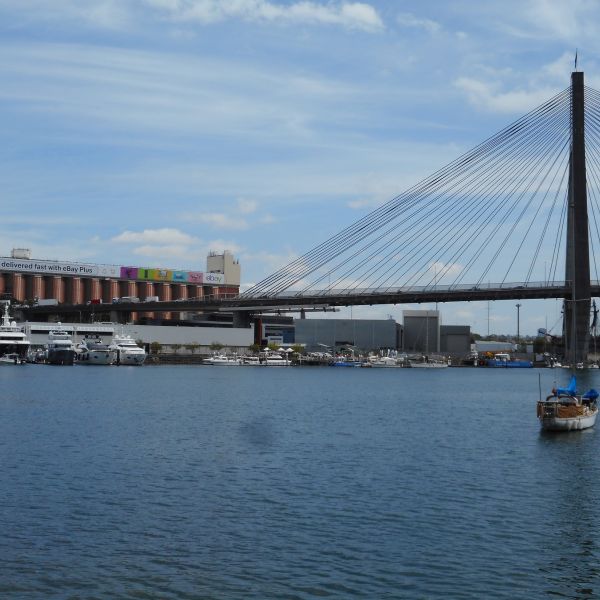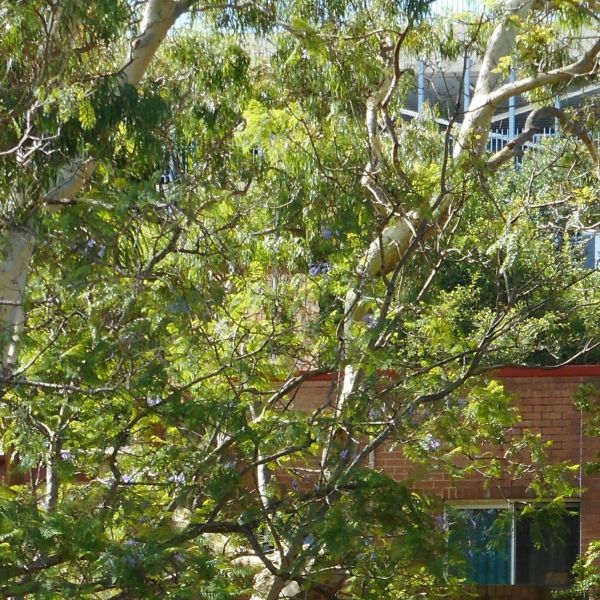Glebe Stories
Home, neighbourhood and community
Compiled from oral histories recorded in 2021.
World War I drill hall
Formerly the site of a World War I drill hall, the land between 69 and 85 Hereford Street was sold for residential use in the late 1990s.
‘And we ran a campaign saying they should give it to the community …we dug up all the figures about how many people from Glebe had died in World War I.’ [Denis Doherty, 19/11/2021]
Anzac Bridge
‘Our flat looked over Rozelle Bay. So you know, we could hear…every morning around half past six, the roar, roar of the traffic coming in across the Anzac Bridge.’ [Denis Doherty, 19/11/2021]
186 Glebe Point Road (Glebe public library)
‘The government decided [the former Homeopathic Hospital building] would be a great place for a half way house for women prisoners…I’d spent a lot of time with Mum Shirl, and a lot of Mum Shirl’s work was going to prisons and talking to prisoners…and living next to us was one of the most famous ex-prisoners in Sydney, a guy called Tim Anderson…So Tim and I got together and we created this organisation called Fair Go Glebe and we started running a counter campaign to what the Glebe Chamber of Commerce was running. And anyway… that went fairly ignominiously, in the sense that it was a massive failure on our part.’ [Denis Doherty, 19/11/2021]
Broadway shopping centre (opened 1998)
‘We wrote a community charter for the people who were doing the Broadway development….About half way through the development, [the developers] sold or they went out of business or something, and they sold it to Mirvac. And Mirvac…came in and threw everything out that we had agreed to.’ [Denis Doherty, 19/11/2021]
Glebe Community Centre (160 St John’s Road)
‘somebody asked me to help with the community centre at the Glebe Town Hall, and I was running that for a while.’ [Denis Doherty, 19/11/2021]
WHOOSH Care Glebe (St James Primary School)
‘…and then somebody else came along and asked me to help with WHOOSH Glebe primary school and I was doing that for a while.’ [Denis Doherty, 19/11/2021]
Glebe Youth Centre (84 Glebe Point Road)
‘We put a lot of pressure on the government to move us up the road a bit to an old cinema, not the Valhalla, but where the youth service is now. I was the Chair and Secretary and Treasurer at different times.’ [Denis Doherty, 19/11/2021]
Cowper and Elger Street redevelopment
‘They decided they were going to evict people from Cowper Street. And they called it the Cowper Street redevelopment project, which is a fancy name for evicting people…A barrister woman started putting out material…and she called her group Hands Off Glebe and so we joined with her and started pushing to save the site and so on.’ [Denis Doherty, 19/11/2021]
Old Fire Station (113 Mitchell Street)
The Glebe Youth Service briefly operated from here when its premises at 84 Glebe Point Road were found to be a fire hazard.
‘It was a very small place and it was sort of set up for people my age who did knitting and crocheting…’ [Denis Doherty, 19/11/2021]
Formerly a timber yard
‘You know, when I was a child, we used to go by bus past [Blackwattle] Bay, and the whole bay would be full of logs just floating in the water. An there was a big sawmill there.’ [Denis Doherty, 19/11/2021]
Fish Markets
‘When I moved here, the Broadway shopping centre hadn’t been developed, so there was kind of no supermarket. We used to go down to the fish markets to do our shopping, or to Haymarket to do our shopping, or in Newtown.’ [Emily, 3/12/2021]
Cowper Street Redevelopment
‘I met Hannah and Denis when they were going to pull down the flats on Cowper Street, which would have been about 15 years ago now. Because the then Minister for Housing pulled them down and they were a vacant lot for about 5 years.’ [Emily, 3/12/2021]
Another Cowper Street redevelopment project
‘…a low rise, very handsome, you know, nice development which they’re just about to demolish.’ [Emily, 3/12/2021]
92 Cowper Street
‘It was a Department of Housing house…We organised a rally to discourage people from buying it really, because you know…its a perfectly good house…a tenant should be moved into it.’ [Emily, 3/12/2021]
Glebe foreshore
Interviewer: ‘Which of the open spaces do you like to use. Do you walk down to the water?
Emily: ‘Yeah, yeah, until that became so unpleasant with the crowds over COVID.’ [3/12/2021]
Victoria Park
‘You know, the privatisation of public property is ongoing and continuous. And you know, I use Victoria Park. Why does Victoria Park get swallowed up for a car park for people that come and use the swimming pool?’ [Emily, 3/12/2021]
Wattle Street footbridge
Emily: ‘Why weren’t we given a bridge access to Victoria Park?’
Interviewer: ‘Across Broadway?’
Emily: ‘Yeah, across Broadway. It’s ridiculous you know. They spent all that money on…a bridge across Wattle Street for this school. Schools I keep on saying are only open 36 weeks a year now.’ [3/12/2021]
Broadway Shopping Centre – Bay Street entrance
‘So, the entrance on Bay Street has been changed about 4 times because it’s a bottleneck.’ [Emily, 3/12/2021]
Hands Off Glebe rallies
Interviewer: ‘So how often do you have rallies?’
Emily: ‘Well we kind of have two, two a month. And we’re going to change it…because I don’t think 8 till 9 o’clock in the morning is a good time. Because there aren’t pedestrians, because the mall’s not open.’ [Emily, 3/12/2021]
Former Harold Park Paceway
‘And we were still very affected by Harold Park Paceway with the horse racing on Friday nights. And the whole district absolutely packed with cars, with people parking their vehicles so they could go down to the racetrack…And you’d here the race being called and the crowd shouting that wonderful human roar at the end of the race. And all that’s gone. [Alison McKeown, 2/12/2021]
Blackwattle Bay Park
‘The timber industry was moving out and a developer was buying the land. And people said, ‘Hey, this is the one chance we’ve got in the next 100 years to that land come back into public hands for public enjoyment.’ [Alison McKeown, 2/12/2021]
Open space during COVID
‘Well, come to 2020 and 2021, the number of people who had to be out and about with COVID-19 lockdown, out in the open space, was huge. And you know, those waterfront parklands were just packed with people.’ [Alison McKeown, 2/12/2021]
Cook Street construction
‘And we got the call early in the morning to get down to the bottom of Cook Street because construction was, well actually bulldozing was, about to begin to shape up for the flats there. So down we rushed. And I was there with our little baby second son in his little pram, standing at the bottom of the hill with this bulldozer above us.’ [Alison McKeown, 2/12/2021]
Wasteland (now a park)
‘But yes, there was a wasteland down there. And I remember we went down there and we planted trees in it. We had a big tree planting ceremony.’ [Ted McKeown, 2/12/2021]
Bellevue Cottage (55 Leichhardt Street)
‘there was an old house down there that [the developer] agreed to leave as a sort of civic centre which they then tried to bulldoze on the quiet.’ [Ted McKeown, 2/12/2021]
Valhalla cinema (previously The Astor)
‘A lot of things have changed. I mean, we used to have our own cinema. That’s the Valhalla. That’s gone.’ [Ted McKeown, 2/12/2021]
Glebe Hockey clubhouse
‘Glebe Hockey Club’s got a clubhouse underneath the arches. The arches created by the the old railway line that’s been repurposed now to be a light rail going through to Dulwich Hill.’ [Alison McKeown, 2/12/2021]
Derwent Street
‘Bernard [Smith] and I were walking down Derwent Street. And he said, ‘You know, this is one of those beautiful streets in Sydney and it always reminds me of a country town.’ And it does too. It’s got the scale of a street in a nice country town like Bathurst, Orange or Parkes.’ [Ted McKeown, 2/12/2021]
Pope Paul IV Reserve
‘When we came to Glebe…the only access to the water was right down the bottom of Glebe Point Road. It was about 40 metres wide. It was Pope Paul IV Reserve because apparently the Pope landed there or something.’ [Ted McKeown, 2/12/2021]
Click on a pin to see more information about the places mentioned in the Glebe Stories interviews.
Each person has their own pin colour.
-

Home
Stories about home and life in different parts of Glebe. Alison and Ted moved to Glebe in 1972. At that time Glebe was threatened by a freeway proposal. Denis and also Emily moved to Glebe later, i…More -

Active in Hands Off Glebe
Social justice, community, and taking action on housing through Hands Off Glebe. Denis talks about social justice, his growing interest in local campaigns, and the impetus for forming Hands Off Gle…More -

Active in the Glebe Society
Heritage and community Ted and Alison talk about taking action with the Glebe Society to preserve and improve Glebe. They talk about changes in the community since the early 1970s, the campaign for…More -

Contest
Social housing, heritage and the Glebe Estate Ted, Denis and Emily discuss the social housing areas of Glebe. They talk about how the ideas of community and heritage that defined these areas fifty …More -

Other voices and lost stories
The glimpses of Glebe’s history that emerge from Glebe Stories are just some of many possible histories of Glebe. There are thousands of other Glebe stories that could be told, and thousands more t…More
About
Glebe Stories focuses on one inner city suburb, Glebe, and the memories of the four people who generously gave their time to be interviewed in late 2021.
These four people have each put a lot of energy into fighting for their vision of what Glebe should be. And have been doing this for many years.
I completed this project as the final unit of Master of History studies at the University of New England. I wanted to find out about the connections between living in a place and deciding to get involved in collective action to protect or advance that place. Activism takes time, energy and persistence. How do feelings about home, neighbourhood and community influence the decision to take action?
I’m grateful to the people who agreed to share their experiences in an oral history interview. I hope the compiled stories do justice to their experiences.
Catherine Stuart, January 2021
Human Research Ethics Committee of the University of New England,
Approval No HE21-201, Valid to 31/01/2022


I acknowledge the Gadigal and Wangal people, the Traditional Owners of Glebe and recognise their continuing connection to land, water and community. I also acknowledge the Dharawal and Gandangara people on whose land I live and work. I pay respect to elders past, present and emerging.
-

Home
-

Active in Hands Off Glebe
-

Active in the Glebe Society
-

Contest
-

Other voices and lost stories